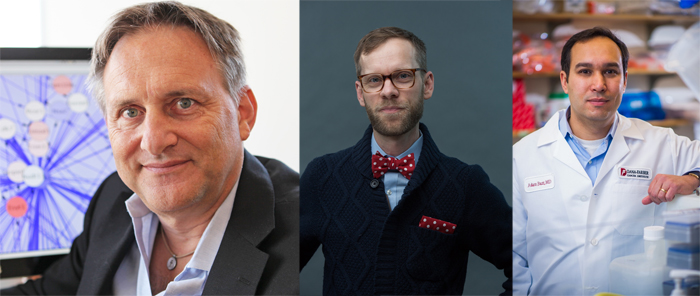News
Columbia, Broad Institute to Identify More Effective Therapies for Gastric and Esophageal Cancers

Three of the investigators in new Columbia, Broad Institute research collaboration aimed at gastric and esophageal cancer; L to R: Dr. Andrea Califano, Dr. Cory Johannessen, and Dr. Adam Bass (Johannessen image: Martin Adolfsson; Bass image: Sam Ogden/Dana-Farber Cancer Institute)
A research collaboration underway between Columbia’s Department of Systems Biology, the Broad Institute of MIT and Harvard, and Columbia University Medical Center (CUMC) is working to accelerate the discovery of new cancer drug combinations targeted at gastric and esophageal cancer. These tumors have not yet attracted prominent research focus and attention, and yet the general outcome for patients with these diseases is poor. According to the American Cancer Society, survival rates are only 20% at five years after diagnosis.
The newly formed research alliance between research teams at Columbia and at the Broad Institute came about thanks to a four-year gift by the Price Family Foundation, known for its philanthropic support of education, health, and biomedical research.
The Columbia-Broad team includes Dr. Andrea Califano , cofounder and chair of the Department of Systems Biology; Dr. Adam Bass , associate member of the Broad Institute; Dr. Cory Johannessen, senior research scientist at the Broad Institute; Dr. Josh Sonnett , the director of The Price Family Center for Comprehensive Chest Care, Lung and Esophageal Center at Columbia; and Dr. Naiyer A. Rizvi , the Price Chair in Clinical Translational Research at Columbia.
In 2016, the Price Family Foundation suggested that a team of scientists at the Broad Institute meet with researchers from CUMC. At the time, the Foundation was eager to leverage the project at the Broad—where researchers had uncovered an interesting finding for gastric and esophageal cancer—with innovative cancer systems biology work it was supporting at CUMC, focusing on the same diseases.
Both teams had been pursuing new computational methods to identify potential cancer drug combinations. Cancer is a wily foe, and single drugs almost never lead to lasting cures. Thus, cancer researchers have become increasingly interested in finding combinations of drugs that effectively kill tumor cells and prevent them from developing resistance.
Until recently, finding these combinations was incredibly time-consuming and costly. However, Dr. Califano, who also is the Clyde and Helen Wu Professor of Chemical Systems Biology at Columbia, and his team had developed a particularly promising new approach to discovering drug combinations. By interpreting mRNA expression profiles following drug perturbations in tumor tissues, using regulatory models that represent the genetic circuitry of cancer cells, they can dissect the activity of around 500 drugs to identify both single drugs and drug combinations that may lead to a complete “short-circuiting” of the cancer cell’s logic. Effective drugs are then tested in cancer cell lines—laboratory models of tumors—to prove that they work. So far, in other tumors, 60% of the predictions made by these approaches have been validated in patient-derived tumor transplants in mice, leading to IND approval by the FDA for several single agent and combination therapies that are now in clinical trials.
To apply these approaches, however, the Califano Lab needed to identify collaborators. “We are very excited,” said Dr. Califano, “to be able to work with the Bass and Johannessen labs who have developed deep expertise in gastric and esophageal tumor biology, availability of patient-derived samples and mouse models, and world-class understanding of the genetic events driving these tumors.”
At the Broad, cancer researchers have been pioneering methods to produce laboratory models at scale. In particular, Dr. Bass, a physician-scientist at the Dana-Farber Cancer Institute and an expert on esophageal cancer biology and genomics, has been generating cancer cell lines and animal models of esophageal cancer.
The team of researchers are combining their complementary strengths with the goal to quickly identify promising drug combinations in esophageal cancer.
“By bringing together these highly established labs, we hope that we can catalyze something transformational and meaningful in a disease that is still poorly understood and largely lethal,” said Dr. Bass.